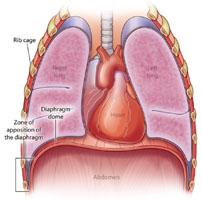The diaphragm is one of those essential muscles, like the heart, that people don’t have to think about until something goes wrong. In a review paper in the current edition of The New England Journal of Medicine, F. Dennis McCool, a professor of medicine and a physician at Memorial Hospital, describes the myriad ways in which dysfunction can occur (including surgical side effects, injuries, and progressive neuromuscular diseases) and how doctors can detect diaphragm problems, which are often underdiagnosed. Among many notable observations is that people suffering from diaphragm paralysis will sometimes compensate with abdominal or rib cage muscles, leading to an abdominal paradox: When they breathe in, their bellies will move in rather than out. McCool and his co-author George Tzelepis, of the University of Athens, also describe treatments and advocate for greater use of ultrasound to diagnose diaphragm dysfunction.
Read more
